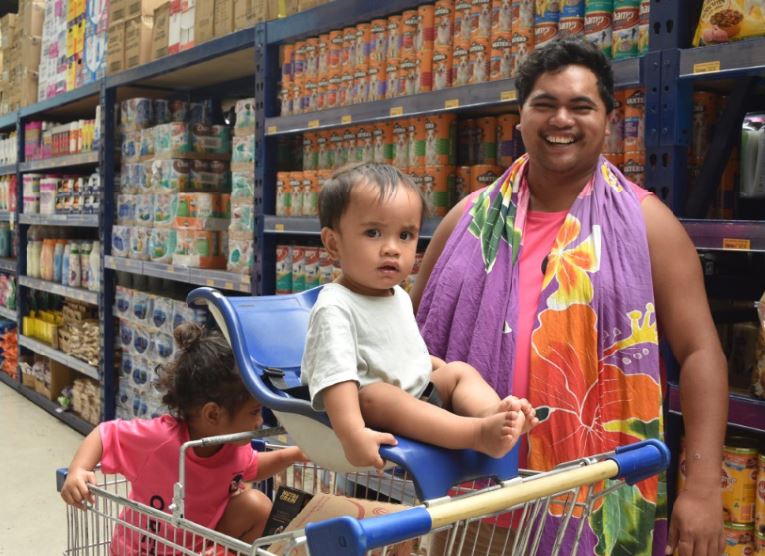Festive feasts at a fortune: Shoppers bite the bullet for holiday cheer
Saturday 23 December 2023 | Written by Losirene Lacanivalu | Published in Business, National

Kimiora Makitae and his children shopping at the CITC Supermarket yesterday. 23122205
Despite the strain on their wallets, shoppers in Rarotonga have no other option but to continue their festive shopping, even with skyrocketing prices.
Shoppers in Rarotonga are tightening their belts and digging deep despite skyrocketing prices as they tackle their Christmas shopping this year.
Poroa Narayan, who was out shopping yesterday for a family Christmas barbeque, said that everything was too costly.
“Yes, everything is very expensive but it is life, this is Raro.”
Narayan said she hoped local supermarkets would have some discounted prices on food.
Kimiora Makitae, a police officer along with his wife, tackled their Christmas shopping yesterday with their children, relieved to get it done before their holiday duty.
“I am working but on New Year’s I would be spending time with my children who came back from their holiday,” Makitae said.
“But everything here is expensive.”
An unprecedented surge in inflation has seen prices of goods rising by 13 per cent – the highest in a decade – over the past year.
According to the recently released 2023/24 Half-Year Economic and Fiscal Update, over the past six months, inflation in the Cook Islands has slowed compared to the previous six months, where there was a significant rise in inflation – “though the fall is not occurring as quickly as desired”.
The peak of inflation was observed in the 12-months leading up to September 2022, during which overall prices rose by 15.3 per cent.
Over the 12-months to March 2023, inflation growth slightly eased to 12.1 per cent, before reducing further to 10.9 per cent by June 2023, the update said.
The update also said the inflation observed was influenced by global factors, including supply constraints that pushed fuel costs higher due to the conflict in Ukraine, leading to increases in food and shipping costs.
The reliance on imports from New Zealand and other regions, where prices have also remained at very high levels, further contributed to this trend, it added.
Cook Islands Chamber of Commerce president Addrienne Hosking-Tinirau acknowledges the impact of rising prices on consumer behaviour.
According to Hosking-Tinirau, retailers are commenting that trading over the festive season has been healthy, with the traditional last-minute rush.
However, a number of external factors have driven up prices, and these were impacting the quantities that people are buying, she added.
“While NZ-Raro freight rates are reasonably flat, freight increases from the US and Asia to NZ have been substantial, which impacts on goods sourced from the wider region,” Hosking-Tinirau said.
“In addition, a number of logistics costs in NZ have increased, the USD/NZD exchange rate remains weak, and fuel prices are still high.
“The Cook Islands is at the very end of one of the longest supply chains globally, and price hikes at every step get passed along the chain. These all contribute to higher retail prices, with the local retailer often being unfairly blamed for an increase they cannot control.”
Tristan Metcalfe, director of Economic Planning Division at the Ministry of Finance and Economic Management (MFEM), said they also recognise that the continuing increases in prices are making budgets tighter for everyone.
“We’ve previously published some guides to give some small tips on how to minimise the impact on people, and these are available on the MFEM website,” Metcalfe said.
“Aside from the day-to-day things Cook Islanders can do, this year’s Government budget provided measures for relief from price inflation for the most vulnerable members of our society – with increases to the rates paid for the Caregivers Allowance, the Destitute allowance and the Power Subsidy. As well as those increases to direct subsidies, the minimum wage was increased by $0.50 to $9 per hour this year.
“Providing support for rising costs is a balancing act, with government only able to provide the support that both the economy can afford, and that which won’t add to the issue by putting further pressure on prices to increase. For this reason, the measures mentioned have been targeted to the most vulnerable in our society.”
Metcalfe said beyond the specific assistance, the Government is also focused on growing the economy, which will help all Cook Islanders.
“In the year to June 2024, the Cook Islands economy is forecast to grow by nearly 10 per cent from the year to June 2023.”
- Additional reporting by Rashneel Kumar

















































